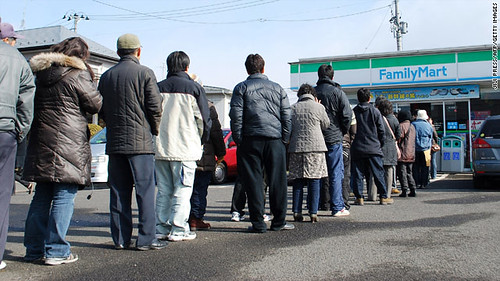I found this article online at (http://news.blogs.cnn.com/2011/03/12/orderly-disaster-reaction-in-line-with-deep-cultural-roots/) and this article shows why i love Japan and have fond memories of my holidays there as its people are so polite and considerate and even during times of crisis they can be so calm and orderly. Really impressed by their resilience and am sure they will survive this crisis!
The layer of human turmoil - looting and scuffles for food or services - that often comes in the wake of disaster seems noticeably absent in Japan.
“Looting simply does not take place in Japan. I’m not even sure if there’s a word for it that is as clear in its implications as when we hear ‘looting,’" said Gregory Pflugfelder, director of the Donald Keene Center of Japanese Culture at Columbia University.
Japanese have “a sense of being first and foremost responsible to the community,” he said.
To Merry White, an anthropology professor at Boston University who studies Japanese culture , the real question is why looting and disorder exist in American society. She attributes it largely to social alienation and class gaps.
"There IS some alienation and indeed some class gaps in Japan too but violence, and taking what belongs to others, are simply not culturally approved or supported," White said in an e-mail.
Pflugfelder is in Japan for a conference and has witnessed the calm response in Tokyo firsthand. Tokyo is hundreds of miles from the 8.9-magnitude earthquake’s epicenter and the widespread devastation.
Pflugfelder was inside the National Diet Library when the earthquake struck.
“The fact that the library decided to let people stay an hour and a half past closing time was one of the first things that made me realize the scale of the disaster because that kind of departure from schedule, from the norms, is quite unusual,” he said.
The orderly lines that formed when the subway reopened around midnight also made an impression on Pflugfelder.
“Such social order and discipline are so enforced in ordinary times that I think it’s very easy for Japanese to kind of continue in the manner that they’re accustomed to, even under an emergency.”
The communitarian spirit at the foundation of Japanese culture seems to function even more efficiently under the stress of disaster, he said.
The natural American inclination is to operate independently.
“So you do everything you can to protect your own interests with the understanding that, in a rather free-market way, everybody else is going to do the same. And that order will come out of this sort of invisible hand.
“And Japanese don’t function that way. Order is seen as coming from the group and from the community as a sort of evening out of various individual needs.”
Will this social attitude help Japan recover from this disaster? "In a word, yes."

No comments:
Post a Comment